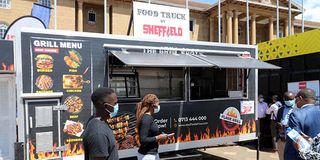Meat storage and preservation with Sheffield Africa
Sponsored by Sheffield Africa

A Sheffield Africa unit on display at the November 18-19, 2021 meat expo in Nairobi.
The foodservice industry in Kenya leans heavily on meat – products that are quite challenging to store and preserve, yet the dearest. Wastage, therefore, would be quite costly.
Cold chain management in meat supply is of utmost importance for the maintenance of the quality and safety of meat and meat products. Traders in the meat industry frequently face the dilemma regarding the type of cold chain system to use in delivering products to retailers or end consumers. There’s often the choice between frozen and cold storage.
The complexity of the global meat supply chain, with frequently long distribution channels associated with transportation of the product, makes the solutions for chilling and freezing important for the overall success in the delivery of product that will be accepted by the consumer for its freshness and safety levels.
If the cold supply chain is breached, meat and meat products will suffer from a range of quality problems such as shrinkage, rotting, trim loss, unpleasant odour, colour and texture changes as well as exacerbated health risks from pathogens.
To help maintain a smooth cold chain in transit, Sheffield Africa offers containerised cold rooms, and mobile cold rooms for trucks. They use highly impermeable Polyurethane Foam (PUF) panels and stainless steel pane finishing for extra hygiene.

The first thing to understand when considering storage options is that not all meats are equal and that their storage times reflect this. The fat and water content, as well as the size of the cut, will change how long a piece of meat can be stored without losing its quality.
Temperature is the main post-processing parameter in the determination of shelf-life in a cold chain of chilled and frozen food products. Kitchen and restaurants often utilise upright chillers and freezers, an optimal option when only minimal refrigerated space can be accommodated.
Blast freezing meat is another quick and reliable way of preserving produce for a future date. But where fridges and freezers are in use, and more temperature-controlled space is needed, a cold room may be the optimal solution for you. Custom cold rooms are also often more energy-efficient than using multiple fridges and freezers.
Team Sheffield has a demonstrated capability to execute large refrigeration projects. They have 10,000sq.ft cold room PUF panels’ fabrication facility with a production capacity of 300 panels per month.
Given Sheffield’s extensive range of refrigeration monitoring solutions, experience, and know-how, its cold rooms offer flexibility due to quick assembly and disassembly in case of expansion or relocation.
The company’s refrigeration solutions will give your products a chance to increase the shelf life under a controlled cold chain system. Sheffield’s goal is to create energy savings, hygienic, long-lasting, and cost-effective solutions with minimal environmental impact.
With new developments such as containerised butcheries that include a cold storage facility, meat processing solution, and a Deli, Sheffield will offer you a tailor-made setup to meet your meat storage, supply, and processing requirements.
Visit the company’s showroom for a wide range of concepts, some of which you can see here.


